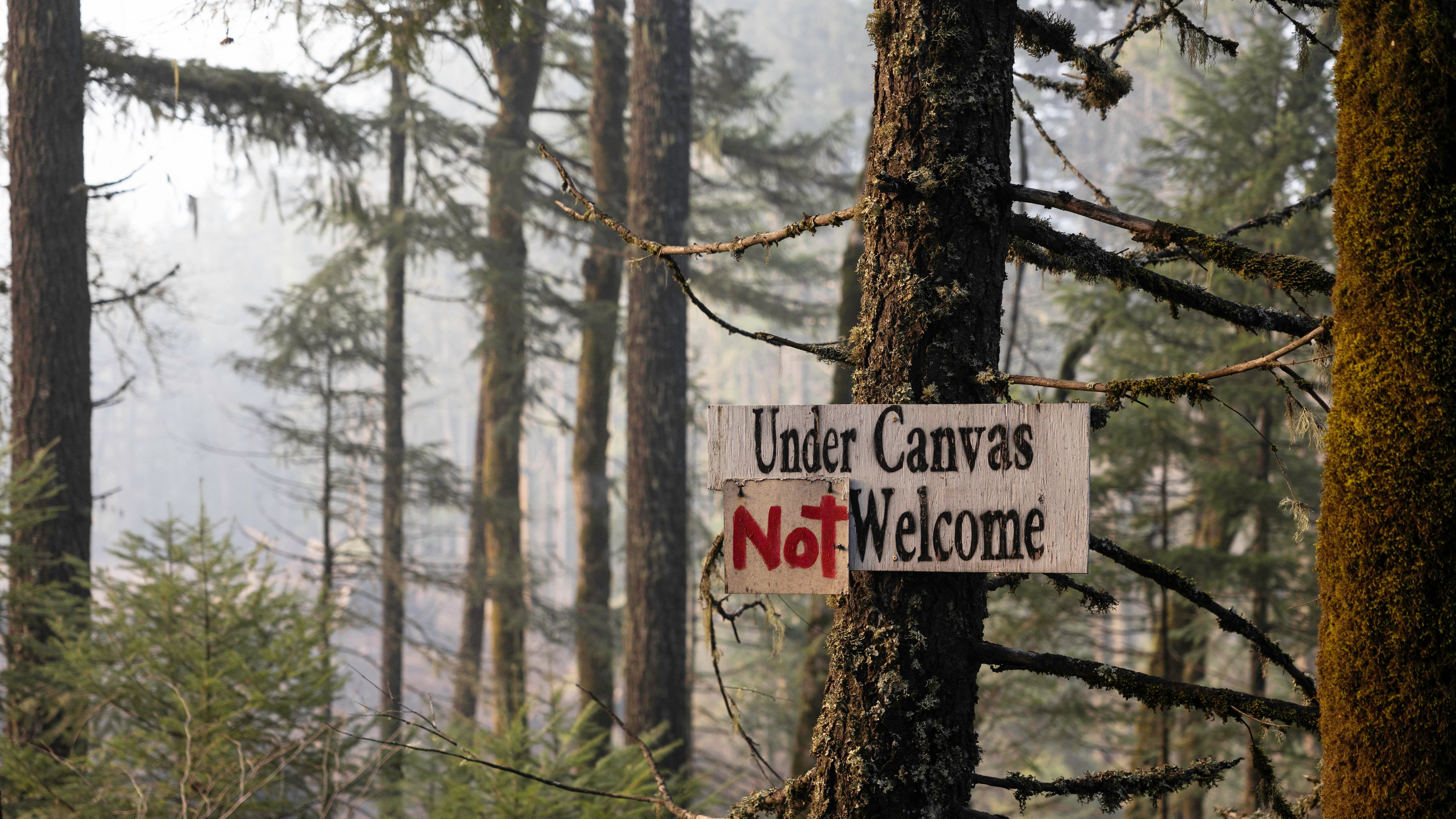About 70 miles east of Portland, on the Washington side of the Columbia River Gorge, lies the small rural community of Husum. The no-stoplight town, part of unincorporated Klickitat County and without its own population count, houses a post office, a firehouse and two whitewater rafting companies for tourists who want to paddle the White Salmon River. The water rushes right through the center of town on its way from the slopes of Mount Adams to the Columbia River.
“It’s a small hamlet, really,” says Dennis White, as he turns his station wagon onto Oak Ridge Road toward his home. But there are intruders in his glen. As we weave through the conifer forest of Douglas firs and ponderosa pines on a windy December morning, we pass about a dozen homemade signs dotting the side of the road:
“Under Canvas Not Welcome.”
On some, though, someone came and sawed out the “not.” The original sign-owners replaced the word, but this time in bright-red letters.
The debate playing out on protest signs hints at a four-year legal battle that White, his wife, Bonnie, and a vocal coalition of other Klickitat County residents have waged against a Denver- and Bozeman, Mont.-based company called Under Canvas.
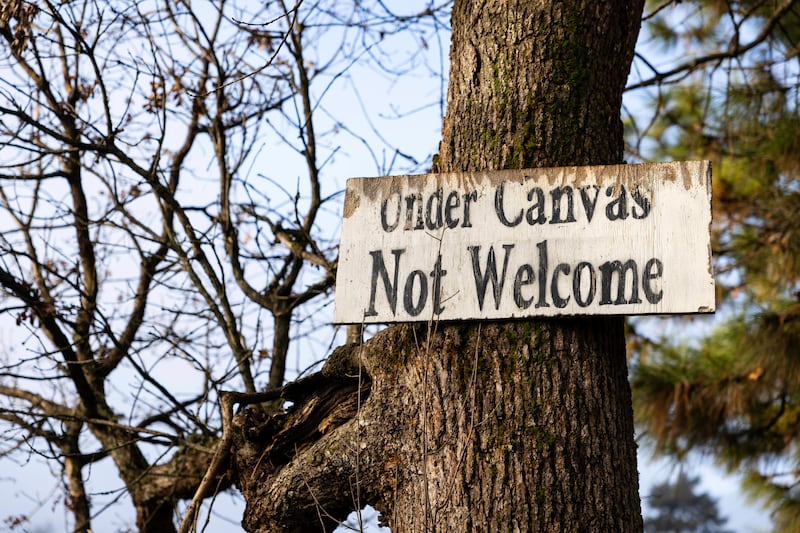
Portlanders who dabble in the glamping world might already be familiar with Under Canvas, the hospitality company with sites in jaw-dropping locations at the border of national parks like Glacier, Yellowstone and Acadia and Mount Rushmore National Memorial.
In October, the company announced its newest location, in the Columbia River Gorge, the first not tied to a national park or memorial. The site, scheduled to open this coming spring, will include 50 “upscale, safari-inspired canvas tents,” each with a king-sized bed, a gas fireplace, and an en suite bathroom with flushing toilet. Guests will pay $229 to $989 a night to sleep under the stars.
There is West Elm furniture in the lobby tent, an on-site yoga deck, and a full breakfast and dinner menu, nightly s’mores, and acoustic live music. Brand collabs include Gibson (guitars), Pendleton (blankets), Hydro Flask (drink ware), Black Diamond (hiking poles) and Aviator Nation (sweats and hats).
“It’s for city slickers who love the outdoors but want to enjoy comfort in nature,” says May Lilley, Under Canvas’ chief marketing officer.
Starting in May, hundreds of glampers—a portmanteau of “glamorous” and “campers,” for those who haven’t been following the high-end outdoors industry for the past decade or so—will have a head-scratching moment about the curious protest signs as they drive the dozen or so miles from nearby White Salmon, Wash., to the glampground.
Neighbors anticipate a nightmare. They say the roads to the glampground are unsafe for the amount of traffic they will soon carry. It’s not just the potential for collisions and road dust, though—the increase in human activity comes with wildfire danger, especially since out-of-towners might not have the memory of the 2017 Eagle Creek Fire that burned 50,000 acres in the Gorge with one firework fresh in their minds.
“All it takes is a fallen tree,” Dennis White says, “and the glampers are trapped.”
As with most of the Whites’ claims, Under Canvas disputes this.
The road is up to code for fire access and evacuation, Liley says, and Under Canvas is developing their emergency response plans under the guidance of the fire department and Klickitat County.
“The Under Canvas Columbia River Gorge project was approved under Klickitat County Zoning Code in August 2020,” Lilley says. “While appeals have been leveled against the project by a few locals since, approvals have been upheld at every level.”
The saga has escalated past the Klickitat County Board of Commissioners (where one of the three commissioners had to recuse himself from the proceedings) to the Washington Court of Appeals and cost the Whites $80,000 and four years of what was supposed to be a quiet country retirement. Despite all that resistance, the glampground is currently under construction and slated to open May 29.
And the question remains: Is getting pampered in the woods bad for the woods?
Glamping is on the rise nationally, and in the Columbia River Gorge. The sector has attracted 15.7 million campers in the past five years to what industry professionals call “outdoor hospitality.” Under Canvas guests had been asking for a camp in Washington for years, Lilley says, and she anticipates they will fly in from all over the country to stay there, though it will also pull visitors from Portland and Seattle.
This isn’t the first glamping site to arrive locally. Skamania Lodge launched its glamping tents in May with bougie amenities, such as soaking tubs overlooking the forest and dual-controlled heated mattresses on the king beds.
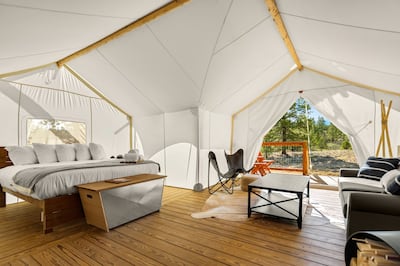
Under Canvas was founded by Sarah Dusek after spending her early 20s as an aid worker in Zimbabwe. She wanted to bring a reimagined African safari experience to the States, with minimal water use and zero waste (and, apparently, king-size beds). It started with a camp in West Yellowstone in 2012. Sarah and Jacob Dusek sold Under Canvas for a reported $100 million to KSL Capital Partners in 2018. When selecting the site outside Husum, Under Canvas was won over by its Mount Hood and White Salmon River views and its proximity to whitewater rafting and the charming towns of White Salmon and Hood River.
Under Canvas says it goes to great lengths to respect the land. Its eco-friendly practices include minimizing light pollution with only bedside lanterns for guests at night (Under Canvas operates the first-ever DarkSky-certified resorts in the world), low-flow toilets and pull-chain showers. All of the resorts are “designed to minimize disturbance, maximize open space, and flow with the natural topography of the land,” according to the company.
The brand is “a great custodian for what is otherwise private land which could be developed in any number of ways,” Lilley says. About three-quarters of Under Canvas’ Gorge property remains open space for forest and grazing, and the 30 acres of the White Salmon Wild and Scenic Corridor remains untouched, she says.
When Lilley came to the Gorge in October in advance of the new site announcement, she drove around the region and found mostly small, bed-and-breakfast-style accommodations but not a ton of Under Canvas competition, she says.
“I think we do really stand alone here,” she says. “It doesn’t feel like we’re bumping elbows.”
But the company has certainly bumped up against residents.
The Whites’ home on Oak Ridge Road befits a lifelong environmentalist and a watercolor landscape artist, respectively. The couple was instrumental in having the White Salmon designated a National Wild and Scenic River back in the 1970s. For two decades, they ran an organic, commercial pear and apple orchard on their 16-acre property, delivering fruit to crunchy OG Portland hot spots like People’s Food Co-op in Southeast and Food Front in Northwest. Today, Bonnie paints watercolors of Gorge attractions such as birds, waterfalls, and fields of wild poppies.
After retiring from farming—Dennis is 80, Bonnie’s not far behind—the Whites thought they would enjoy a quiet time in the restored turn-of-the-century farmhouse they’ve lived in for 44 years. With his long hair, mustache and work jeans, Dennis looks the part of someone who came of age with the generation of environmentalists who invented Earth Day in 1970. The word “glampground” sounds strange in his mouth.
The Whites got involved in the Under Canvas controversy in 2020. The site is just a few hundred feet from their property line, though right now all passersby can see is an unmarked driveway with a “No Trespassing” sign. First, they fought Klickitat County’s State Environmental Policy Act determination that the Under Canvas site came with “non-significant” environmental impacts that could be mitigated. The Whites and other community members flooded the county with about 100 comments, many with the same themes: wildfire risk and dodgy road access. The SEPA decision stood.
The glampground is located in a heavily forested area on a southwesterly sloping hillside prone to windy, dry conditions, Dennis says. There was already a fire on the construction site Aug. 12, but it was extinguished promptly. Still, it fueled the Whites’ worst fears.
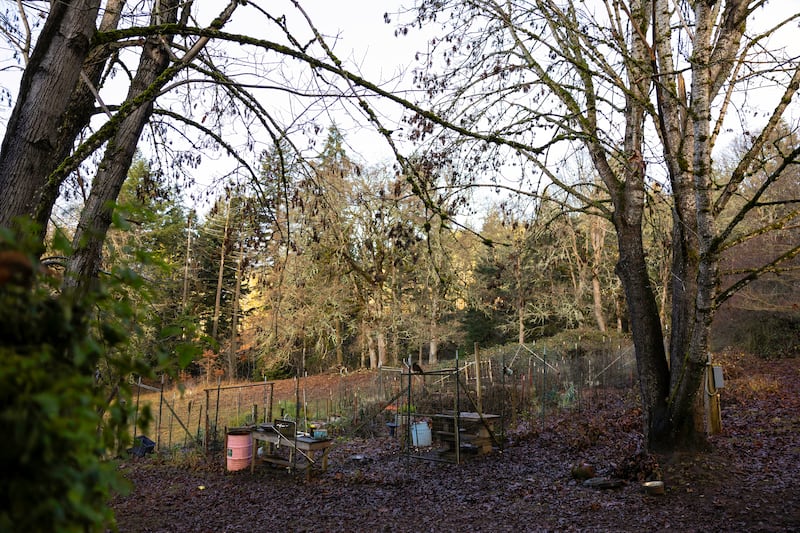
“Take all the human activities that are going to happen there and the potential for wildfire is tremendous,” Dennis says. “My family’s property, our house, and all of our neighbors are going to be under constant wildfire threat every day of their operation. All it’s going to take is one fire to get started on a hot July morning, the wind blowing like hell, and a wildfire is going to get out of hand.”
May Lilley of Under Canvas says the company maintains an “impeccable” fire safety record at its 11 glampgrounds. In the Gorge, it will have round-the-clock staffing, an enhanced water supply, and firefighting equipment, and the company will reduce fuel that might feed a wildfire by removing downed trees and thinning overgrown stands.
To the Whites’ other point—the inadequacy of Oak Ridge Road—the couple did their own traffic impact studies and estimated that traffic would balloon tenfold, from 30 vehicles a day to 300. Two miles of the winding road are “primitive” (gravel), and the speed limit is kept to 25 miles per hour in part to protect the cattle that a nearby ranch family has let roam for more than a century. The Whites envision a near future in which they have to wear dust masks just to work in their front yard and are at risk of head-on collisions every time they drive into town for groceries.
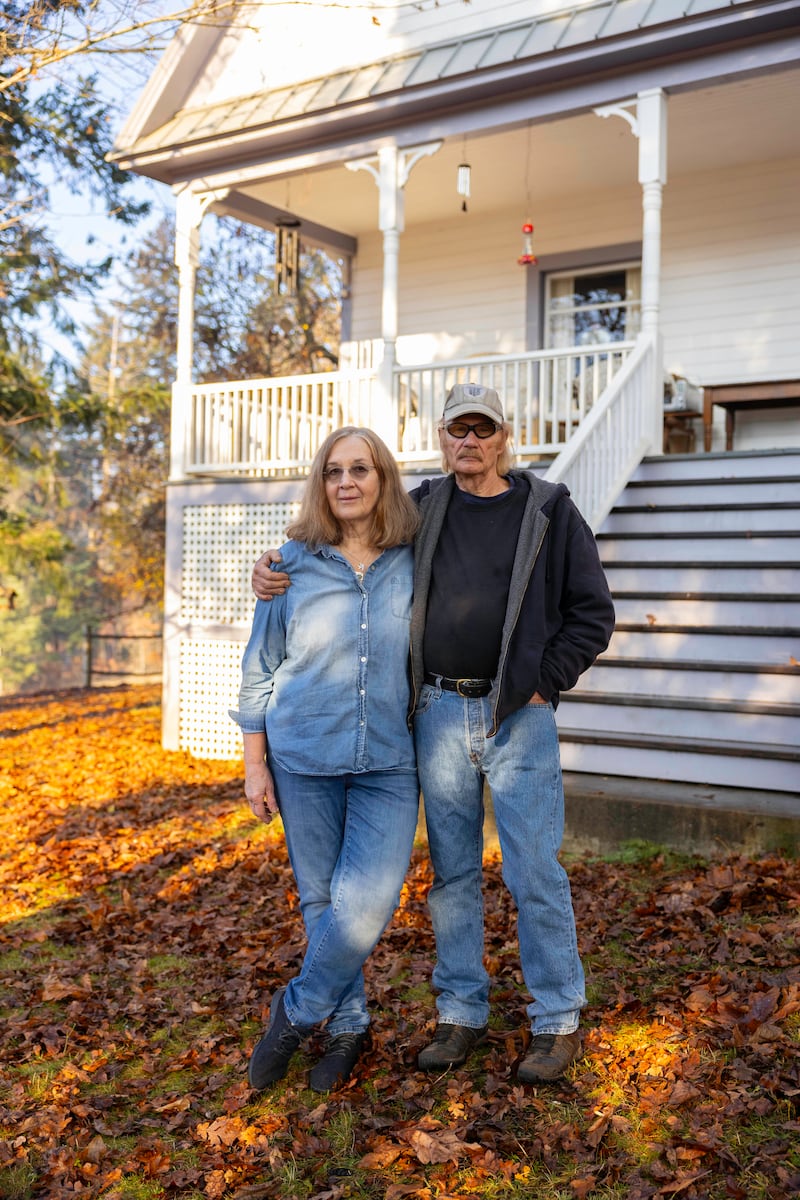
To prove these points as we drive down the road, Dennis repeatedly stops his car to point out all of the places where the road does not meet safety standards. On curve number one of the four in question, he asks, “Do you have a 155-foot line of sight right now? No, you do not.” A logging truck goes by, and he points at how the truck hangs over into our lane. He then pulls out the nine photos he has on hand of places where the road is narrower than the required 20 feet across. He and Bonnie went out with a white, 20-foot ribbon to show all the places the roadway hangs over banks or runs into the gravel shoulder or brushes against trees.
While recognizing that they live in one of the most stunning landscapes in the country, the Gorge neighbors are a little confused by the appeal of Under Canvas’ specific site. The glampground near Husum used to be Longview Timber land, until the woods were sold to the lumber company Weyerhaeuser in 2013 and split into 80-acre parcels. Under Canvas snapped up 120 acres.
“You’re going to be basically in a clear cut,” says John Farnum, whose family owns a 15-acre vineyard next to the Under Canvas site. “You’re going to be roasting in the summer, and it’s not going to be very pleasant. So the way they sell it is going to be really interesting.”
There’s no river access, though Farnum doubts that will stop glampers from forging their own trails to the water.
The Under Canvas site was “rubber stamped” all the way through the board of county commissioners, the hearings examiner and the appellate courts, Farnum says.
“I never really got a sense that anybody along the way, from the county to the judges, really saw the concerns that everyone was voicing,” he says, despite letters of opposition coming from a broad range of groups, including Friends of the White Salmon River and the Confederated Tribes of the Yakama Nation.
As the dispute over Under Canvas started to heat up, some of the officials holding the rubber stamps turned out to have conflicts of interest.
Klickitat County Commissioner Jacob Anderson recused himself from all matters regarding the glampground due to “a personal friendship with a representative of Under Canvas.” Anderson would not be interviewed on the record for WW, but previous reporting in Columbia Gorge News revealed that he visited an Under Canvas site at his own expense to “provide an informed report to the community council about the experience.”
Under Canvas says it will bring business to local adventure outfitters and wineries in the region. One of them, Zoller’s Outdoor Odysseys, was vocal in its support for the glampground in 2020. Lori Zoller is one of the three Klickitat County commissioners.
After initially agreeing to an interview, Zoller stopped responding to emailed requests for comment.
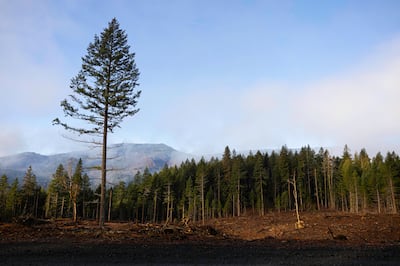
Still, a few modest victories for the neighbors came from the litigation. Under Canvas has to obey groundwater restrictions, and it ditched a plan to have woodstoves in all of its tents. But soon after the Whites lost in the Washington Court of Appeals in 2023, Bonnie knew there was no stopping the project.
“We could have gone on asking for help and money from all the neighbors, but at that point we just didn’t feel like we could spread ourselves thin enough to continue to attempt to raise money and keep everybody informed,” she says. “We just didn’t have it.”
Since then, one more issue with the glampground has emerged. In November 2023, the state of Washington elevated the western gray squirrel, which nests on the site, from a threatened species to an endangered one. The Whites have been trying to protect the western gray squirrel’s habitat in these exact woods since the 1980s, when they protested logging in front of the Heathman Hotel in downtown Portland. (The Stevenson timber family owned both the woods and the hotel at the time). They were successful, and Dennis White still harbors a flicker of hope against Under Canvas.
“I’m not sure the litigation is completely over,” he says. “There are still some angles we have.”
Under Canvas’ Gorge glampground does not stand alone in the rural opposition it has inspired. A community in Castle Valley, Utah—a rural area with great whitewater rafting—is now also rallying opposition to a proposed Under Canvas site on the grounds of wildfire risk and wildlife protection.
Both conflicts are over the same core issue: Who gets to enjoy the woods? Everyone’s jockeying for space—locals, timber companies, free-range cattle, western gray squirrels, and now glampers. Where does Under Canvas fall in the hierarchy?
The Whites and the neighbors who posted the “Under Canvas Not Welcome” signs on Oak Ridge Road would prefer the company to stay back in Bozeman. All that western gray squirrel habitat that the Whites fought to protect at the Heathman? A timber company chopped down whole lots of Oregon white oaks this summer. “They logged one of the most beautiful conifer forests in Washington state to death,” Dennis White says.
The conversation turns to climate change and how, at his age, White is glad he won’t be around for the worst of it. He has already seen enough to break his heart.
“This is the heart of the White Salmon Wild and Scenic River where they’re putting that campground and where this destruction is taking place,” Bonnie White says. “It should never have been allowed to happen.”

